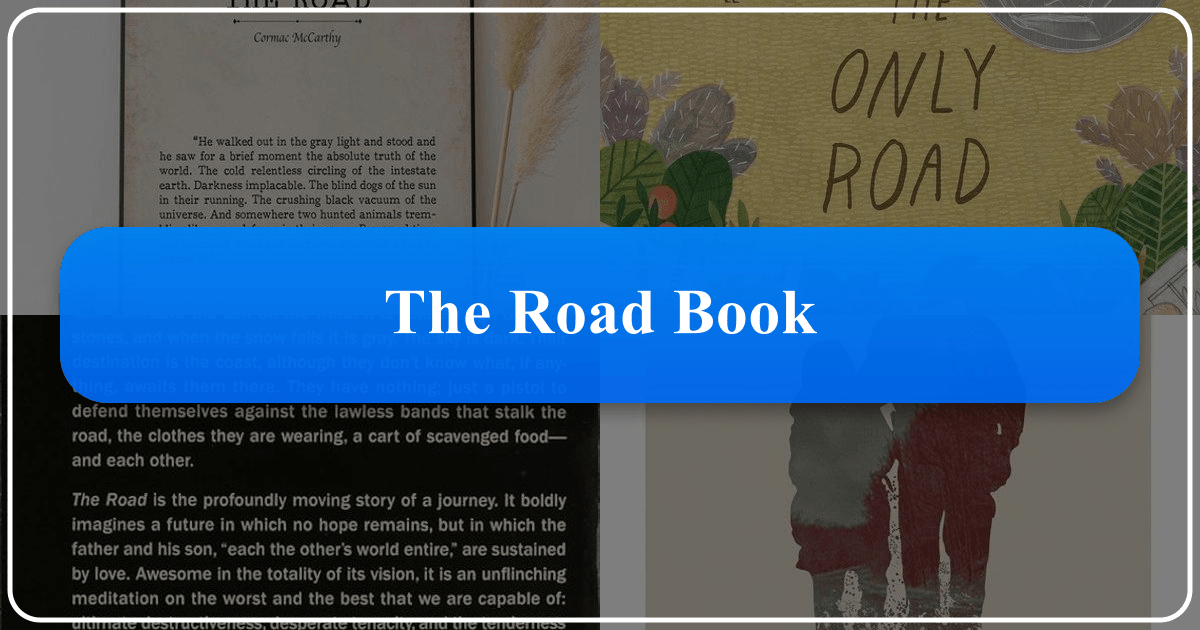The Road Book: A Journey Through Cormac McCarthy's Post-Apocalyptic Masterpiece

Cormac McCarthy’s The Road transcends the typical post-apocalyptic narrative, becoming a profound exploration of fatherly love, human resilience, and the enduring power of hope in the face of unimaginable devastation. This “road book,” as it might be called, takes us on a harrowing journey across a desolate landscape, mirroring not only the physical struggles of survival but also the deeper, internal battles waged by a father and son against the encroaching darkness of a broken world. This exploration delves into the various aspects of the book, its literary significance, and its lasting cultural impact.

Exploring the Genres and Literary Style of The Road
The Road defies easy categorization. While undeniably a post-apocalyptic novel, its thematic depth extends beyond the genre’s typical concerns with survival and societal collapse. Elements of dystopian fiction are present, depicting a world stripped bare of its former glory, yet the novel’s core is a deeply intimate portrayal of a father-son relationship. This intimate focus elevates The Road into a powerful exploration of human connection and the enduring strength of love in the face of utter despair.
McCarthy’s stark, minimalist prose style is a defining characteristic of the novel. His sentences are often short, declarative, and devoid of embellishment. This stylistic choice mirrors the harshness and bleakness of the post-apocalyptic world. The absence of quotation marks around dialogue further enhances this effect, creating a sense of immediacy and blurring the lines between internal monologue and external events. This unique stylistic choice, while initially jarring to some readers, ultimately contributes to the book’s haunting power. The sparseness of the language forces the reader to confront the raw emotions and existential dread at the heart of the narrative.

Thematic Depth and Symbolic Significance
The novel’s power lies in its exploration of complex themes. The most prominent is the unwavering love between the father and son. This relationship forms the emotional core of the narrative, offering a beacon of hope in an otherwise hopeless world. The father’s relentless dedication to his son’s survival becomes a testament to the enduring power of parental love, a powerful counterpoint to the widespread brutality and despair that surrounds them.
The journey itself is a potent symbol. The road, a physical path across a destroyed landscape, becomes a metaphor for the characters’ spiritual journey towards an uncertain future. Their destination, the coast, remains elusive, representing the elusive nature of hope itself. The constant struggle against hunger, cold, and the threat of violence symbolizes the internal battles against despair and the fight to maintain their humanity. The recurring images of ash and gray skies reinforce the overall sense of desolation and the pervasiveness of loss.

The Authors and Their Influences: Cormac McCarthy’s Vision
Cormac McCarthy’s unique background and writing style contribute significantly to the power and impact of The Road. His earlier works foreshadowed the themes and stylistic choices found in this Pulitzer Prize-winning novel. McCarthy’s distinctive voice, characterized by its starkness and poetic intensity, has become a signature element of his literary work, setting his novels apart from other post-apocalyptic narratives.
The inspiration for The Road stemmed from a personal journey, blending McCarthy’s observations and imaginings into a powerful fiction. This autobiographical element adds depth and authenticity to the novel’s themes, making the father-son relationship even more compelling. The characters’ struggles are not merely fictional constructs; they resonate with the anxieties and hopes inherent in the author’s own experiences. This personal touch, while subtle, enhances the emotional weight of the story.
McCarthy’s Literary Legacy and Influences
The Road stands as a significant contribution to post-apocalyptic literature and a testament to McCarthy’s singular talent. His unique prose style, characterized by its minimalism and starkness, sets his work apart from his contemporaries. The book has been praised for its emotional depth and its unflinching portrayal of human nature’s darkest and brightest aspects.
McCarthy’s influence on subsequent writers and artists is undeniable. The Road has been cited as a major inspiration for numerous works of literature, film, and other art forms. The novel’s exploration of existential themes and its powerful depiction of the human spirit’s resilience have captured the imagination of both critics and readers alike. His unique blend of violent imagery and profound tenderness has left an enduring mark on the literary landscape.
Reading, Learning, and Interpreting The Road: Life Lessons and Educational Value
The Road offers significant educational value beyond its engaging narrative. The novel compels readers to confront challenging ethical dilemmas, ponder the nature of good and evil, and grapple with the fundamental questions of human existence. The stark reality presented within the narrative prompts profound reflection on what constitutes humanity, love, and resilience.
The father’s unwavering devotion to his son, despite the overwhelming despair of their world, provides a powerful lesson about unconditional love and the strength of the human spirit. The father’s attempts to instill morality and hope in his son highlight the importance of transmitting values and beliefs across generations. The struggles of the father and son emphasize the importance of human connection and the value of preserving hope amidst despair.
Reading Habits and Engagement
The novel’s brevity and powerful prose make it accessible yet thought-provoking. The short, declarative sentences might be an unusual choice, but this style contributes to the book’s immediacy and emotional intensity. Readers are drawn directly into the characters’ experiences, which creates heightened empathy and engagement.
The Road is not a casual read; it requires reflection and engagement with its complex thematic material. The bleakness and brutality of the narrative can be emotionally challenging, but this difficulty contributes to the depth and impact of the reading experience. The absence of traditional narrative devices, such as clear plot progression, forces readers to actively participate in constructing meaning and interpretation. This level of reader engagement enhances the lasting impact of the novel.
Libraries and Archives: Preserving The Road for Future Generations
The Road has found its place within countless libraries and archives, solidifying its importance in contemporary literature. It is included in numerous collections in public and academic libraries worldwide, ensuring its availability to present and future generations of readers. The book’s impact is evident in the diverse contexts it has been preserved, reflecting its literary status and ongoing relevance.
The inclusion of The Road in these repositories reflects its status as a modern classic and a work of enduring significance. The preservation of this novel in libraries and archives across the globe ensures that future generations of readers will continue to be impacted by its themes of hope, resilience, and love in a dystopian context. Its presence serves as a testament to its lasting power and importance in shaping contemporary literature and culture.
Digital Libraries and Accessibility
The accessibility of The Road is amplified through its availability in various digital libraries and e-reader formats. This expands the novel’s reach, making it accessible to readers with diverse needs and preferences. The digital format ensures that this significant piece of literature remains accessible to a broad audience.
The widespread digital availability of The Road underlines its enduring popularity and accessibility. This aspect is important because it provides opportunities for a global audience to engage with the novel. The ease of access ensures that the book’s profound themes and stylistic innovations are available to those who might not otherwise have access to it.
Cultural Impact and Literary Influence: The Road and Its Adaptations
The Road has made a profound impact on culture. Its exploration of post-apocalyptic themes has resonated with audiences worldwide. The novel’s themes of human connection and the importance of preserving humanity have sparked numerous discussions, debates, and interpretations.
The film adaptation of The Road further popularized the novel’s themes and ideas. The film, directed by John Hillcoat and starring Viggo Mortensen, brought the novel’s bleak and powerful imagery to the big screen. Its success only served to amplify the novel’s cultural influence and ensure that its message would resonate with a broader audience. The visual representations complement the novel’s profound themes and expand its reach beyond the realm of literature.
Awards and Recognition: A Testament to The Road’s Significance
The Road’s numerous awards and accolades are a testament to its literary and cultural significance. The Pulitzer Prize for Fiction, among other prestigious awards, solidify the book’s position as a major literary accomplishment. The recognition granted to the novel underscores its unique style and enduring themes.
The award-winning status of The Road is a mark of its enduring power. The Pulitzer Prize for Fiction, in particular, cemented the novel’s place in the canon of significant literary works. The acclaim it received from critics and organizations only served to enhance its cultural influence and widespread recognition. This recognition highlights the novel’s exceptional contributions to post-apocalyptic and contemporary literature.
In conclusion, The Road is more than just a post-apocalyptic novel; it is a profound exploration of human nature, the enduring power of hope, and the complexities of fatherly love. Its minimalist prose, haunting imagery, and powerful themes have secured its place as a modern classic, leaving a significant and lasting cultural impact. The journey through its pages, though bleak, is ultimately a rewarding experience for any serious reader.